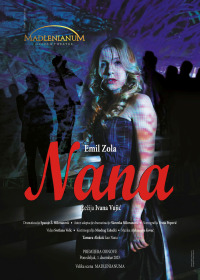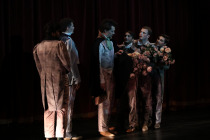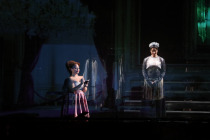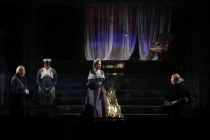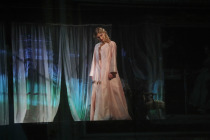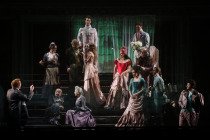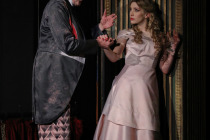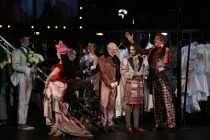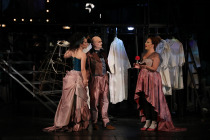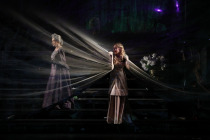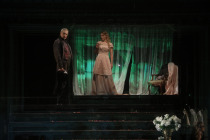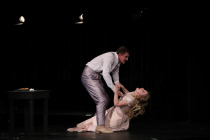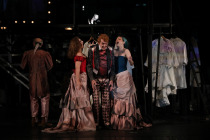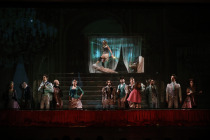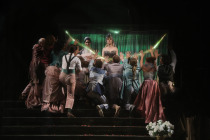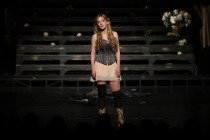Émile Zola
NANA
Book & Buy TicketsNANA TO GRACE THE STAGE OF MADLENIANUM ONCE AGAIN
Premiere Revival: 1 December at 19:30h
Reruns: 13 December and 11 January
Large Stage of MADLENIANUM
A French classic, a masterpiece by Émile Zola, NANA, directed by Ivana Vujic, which had its first premiere in November 2019, returns to the Large Stage on December 1st, with rerun performances on December 13th and January 11th. “This is the only Zola on our stages in Belgrade, and it is wise to have a premiere revival of the play. For us, he is an endlessly interesting writer, exploring one family, he conducted an analysis of French society of that time that is still relevant today”, said the director during a press conference on the opening of the 26th season.
Not enough times performed saga about the corruption of society during the transition from one empire to another, the drama NANA, featuring Tamara Aleksic in the lead role, is returning to the stage under the direction of Ivana Vujic with a somewhat modified ensemble. The intriguing story of the whirlwind of passion, surrender, human desire, and immorality is a relevant theme in nowadays. In the character of Nana, a courtesan disguised as an actress, the play skilfully portrays every woman's impulse for love and security, her dreams, hopes, and hidden desires, as well as a cry for attention and acceptance. The dramatization of Émile Zola novel Nana was done by Spasoje Z. Milovanovic, with Slavenka Milovanovic as the dramaturge, Aleksandra Kovac as the composer, Vesna Popovic as the set designer, Miodrag Tabacki as the costume designer, Marija Milenkovic in charge of stage movement, and Ljiljana Mrkic Popovic of stage speech.
The play ended with a scene revealing that the beautiful main protagonist had succumbed to smallpox, and immediately after, loud and painful cries reached the audience, announcing the call to war. From this four-year distance, this vision of a world disintegrating into immorality and insatiable desire for material and status seems almost prophetic. In the cast of Nana in 2019, was bard of our theatre, Vlasta Velisavljevic, but in 2021, the pandemic took him from us, sending him to the heavenly stage. In memory of this wonderful actor, whom Ivana Vujic spoke about at the conference telling that “Nana is a substantial play with a large ensemble, from the youngest actors to the doyens, and among them was Vlasta Velisavljevic, that was his last role, and we are truly happy to have worked with him, lived with him, and rejoiced with him”, adding that Madlenianum is, due to care for its productions, a very serious, wise, and responsible house.
That marvelous unfortunate girl, who elevates herself materially from the social bottom and reaches the extravagant life of a theatrical star, actually spiritually collapses by selling herself, while within her, love for her little illegitimate son glows as a counterbalance to the darkness that engulfs her life. In the play Nana by Ivana Vujic, with Tamara Aleksic in the title role, the audience is presented with a classic literary masterpiece in a fresh and modern way. Through a sincere and profound artistic approach, eternal themes take on new forms necessary for the development of theatre and for a deeply cathartic connection with contemporary spectators. In this opulent theatrical work, the new actors in the cast include: Nikola Rakocevic, Borjanka Ljumovic, Bogdan Bogdanovic, and Andrijana Djordjevic, while from the previous ensemble, we have Nebojsa Kundacina, Rade Cosic, Vukasin Jovanovic, Dimitrije Ilic, Vanja Milacic, Stojsa Oljacic and Anja Orelj.
____________________________________________________________________________________
A lavish story, showing us French society in the period of the Third Empire, puts in the central place a beautiful girl who from the lowest social class arrives in the Variety Theatre in Paris and becomes the audience favourite by playing Venus. That gorgeous girl Nana the novel is named after inevitably becomes the object of obsession of numerous men who she plays games with, gets hurt by and eventually prematurely leaves this world because of them. The world of theatre and beyond are intertwined, people become goods and NANA, as the soul who longs for rectitude and being a good mother to her little illegitimate son, fails to cope with it, so she indulges in the ostensible success of the completely dark side of life.
The novel Nana is just one of a cycle of novels where Émile Zola faithfully portrays French society in the mid-19th century, through the prism of the Rougon-Macquart family, to which Nana belongs as well. As Dusan Matic, a Serbian surrealist, said: “What has been created under the tireless writing pen of Emile Zola is a new world, unique as a vision, orchestrated as a symphony, full of contrast, storm and beauty, just like a man, society and nature itself are, but still one, clothed and closed in the Papen’s pot of the reign of Napoleon III where all was boiling, the world that can only be compared to Balzac’s world. Members of the Rougon-Macquart family, each of whom is a protagonist in one of the novels, about one thousand two hundred characters, featured and shaped to the end, and then nameless crowds, various surroundings and levels of society, all being brought to life in this cycle by great artistic strength. The whole modern society - with their railways and life dependent on the clock, night shifts, red lights and whistling locomotives, with their mines where they make enormous wealth, with people working like cattle and with their gloomy and monotonous dramas just as everyday life is, taking place; Paris, with its streets and the central market, the belly of the big city, with the Stock Exchange and its brokers and businessmen of the type, prostitutes, politicians and proto- politicians, vagabonds and large warehouses; petty bourgeoisie, small town, clique, clergy, small merchants, stock companies, big bourgeoisie, army, workforce, peasants, all of that and all of them as if they have come out of their shadow for a moment to live, die, fall, rise and disappear in front of our eyes and thus suddenly illuminated reveal to us their hearts, secrets of their bodies and brains, and showing what time it is on the history clock, and then again in the shadows they will continue their "banal" existence under the burden of two "fatalities": "inherited blood" and "social necessity "...
Dramatization of the novel NANA is done by Spasoje Ž. Milovanovic. Directing is signed by Ivana Vujic and her collaborating authors are: a playwright Slavenka Milovanovic, a set designer Vesna Popovic, a costume designer Miodrag Tabacki, a composer Aleksandra Kovac. Here are also Marija Milenkovic as the author of the stage movement and Ljiljana Mrkic Popovic, in charge of stage presence and Svetlana Volic of video.
In his reading of this classic, Spasoje Ž. Milovanovic brings to the fore playing with form of the Boulevard theater, in which Chorus, as a plurality of individual destinies and voices, preserves the memory of a Greek tragedy but also becomes an omniscient narrator, something like a social network, the chosen avatars gathered around retelling Nana's destiny. The quite certain is that - Nana is a reservoir of boundless readings and interpretations. The story, just like the play itself thematizes different narratives of society: theater, politics, banking, media, social classes, passion, love ... exposing the same acting structure. Eliminating the border between theatrical and non-theatrical reality, Nana at all levels of society, from the aristocracy of the Muffat family and the Marquis De Chouard, through the bourgeois banker Steiner or the owner of the Bordenave Theater, to the field of prostitutes, reveals corrupted and completely immoral society. While everyone bathes in immorality, and even Nana's closest people, she remains pure, as an angel of destruction taking revenge against the immorality of society. In the novel Nana, “her work of demolition and death was over, a fly flying from the garbage in the suburbs, bringing the germ of social rot, poisoning all humans with its own touch. That was good and fair, she was taking revenge for her society, the poor and the abandoned. And while her sex in glory was rising and glittering over the outstretched victims, alike the sun at sunrise, illuminating the massacre field, she preserved the unconscious nature of the proud animal, not knowing her deed, always remaining a good girl.”, writes Zola. Slavenka Milovanovic, who was working on dramatization during the rehearsal process, adds: "The great writer Emile Zola could not have anticipated that little Nana will so easily fall to the ground of the 21st century, in which being famous is the only sense of existence.“
Working on the play, a director Ivana Vujic lets us know the following: “Today's world in its struggle for life, the struggle which is demoralizing, where the mutual struggle of individuals is replaced by the struggle of economic organisms: banks, factories, mines, shopping malls, are places where a man is thrown like a ball towards all sides. One moment you are is at the peak of happiness, the next at the abyss. The question of hypocrisy that allows all these is the question of NANA trying to find the place and price in the world of fraud and purchase. Unfortunately, NANA is too emotional for this world where the roles were defined a long time ago."
Directing: Ivana Vujic
Dramatization: Spasoje Ž. Milovanovic
Literary adaptation and project dramaturge: Slavenka Milovanovic
Set Design: Vesna Popović
Costume Design: Miodrag Tabacki
Composer: Aleksandra Kovac
Stage movement: Marija Milenkovic
Lector: Ljiljana Mrkic Popovic
Video: Svetlana Volic
Lightning Design: Srdjan Jovanovic
Audio Design: Dobrivoje Miljanovic
Costume Design Assistant: Snezana Pesic Rajic
Directing Assistants: Marija Mladenovic, Nastasja Danicic
CHARACTERS:
NANA: Tamara Aleksic
COUNT MUFFAT: Nebojša Kundacina
BORDENAVE, Theatre Manager: Miodrag Krstovic
FAUCHERY, reviewer and writer: Rade Cosic
AUNT, the only cousin of Nana: Rada Djuricin
MARQUIS DE CHOUARD: Vlastimir Velisavljevic
ROSE MIGNON, an actress: Vesna Stankovic
AUGUSTE MIGNON, a violinist: Branislav Zeremski
GEORGES HUGON, a young aristocrat: Vukasin Jovanovic
STEINER, a banker: Dimitrije Ilic
ZOÉ, a maid: Aleksandra Bibic Kolarov
MADAM TRICON, a procuress: Vanja Milacic
FONTAN, an actor: Stojsa Oljacic
DAGUENET, an actor: Nemanja Stamatovic
LISA, an actress: Anja Orelj
FALOISE HECTOR, a young aristocrat: Dragan Sekulic
THE SCOTTISH PRINCE: Dragan Petrovic
A MIGRANT: Nastasja Alja Danicic
Stage Manager: Sanja Ugrinic Mimica
Prompter: Anka Milic
Project Organizers: Vlastimir Repic and Davor Perunovic
Stage Master: Milan Ciric
Lighting Realization: Vladimir Krunic
Video Realization: Zvonimir Jelusic
Audio Realization: Dusan Arsikin
Make-up and Hairstyle: Mirjana Rakic
Wardrobe: Tanja Vuksanovic and Miladin Pavicevic

